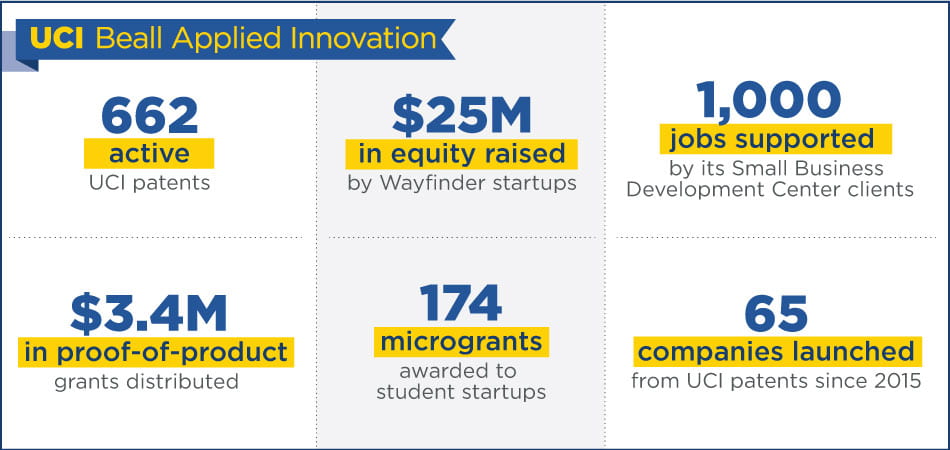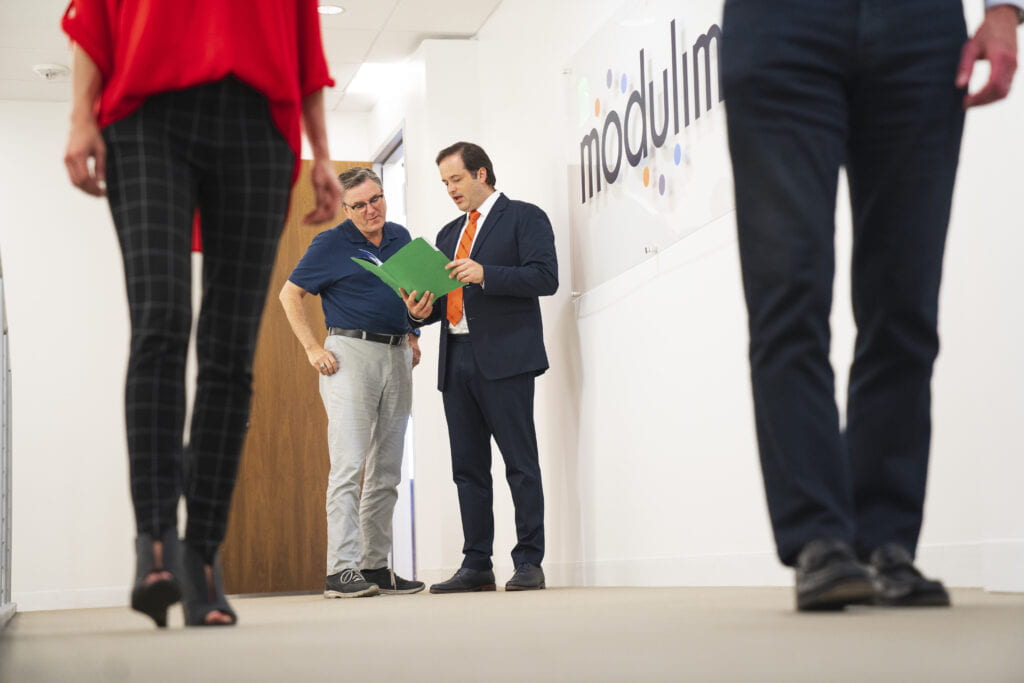Incubating innovation
UCI Beall Applied Innovation is helping make Irvine a growing startup hub

An award-winning innovator who started an agricultural technology company. A UCI alumnus who founded a medical device company. A UCI professor who’s producing rapid tests for COVID-19 and other diseases. Their backgrounds are as different as their companies, but they all launched their ventures at UCI Beall Applied Innovation.
The city of Irvine recently landed on WalletHub’s list of the best big cities in which to start a business and was ranked first for access to related resources. That’s no accident. Irvine’s success is part of a concerted effort that kicked into high gear in 2014 when Applied Innovation opened its doors, bringing together a treasure trove of tools for entrepreneurs.
Martha Montoya, who was named an Orange County Business Journal Innovator of the Year in 2020, launched her startup at Applied Innovation because of its connections with talented, experienced industry mentors.
“It’s like Christmastime,” she says. “Applied Innovation’s No. 1 asset is the people in the ecosystem. I can just grab someone who sold a company for $1.5 billion and ask for advice.”

In 2017, Montoya was driving around University Research Park looking for UCI’s startup incubator to help take her business plan from paper into the real world. After a couple of wrong stops, she located Applied Innovation’s beach-themed space, dubbed the Cove, which at that time was constantly buzzing with activity. Pre-pandemic, the Cove typically welcomed more than 200 daily visitors, from angel investors to executives attending pitch competitions, educational talks, and Monday night football watch parties with startups pitching during halftime. Today, in-person activity is gradually returning to its usual pace.
Montoya got support from Applied Innovation through its Small Business Development Center and Wayfinder incubator, which provides classes, access to experts and investors, and space at the Cove. Her technology company, AgTools – an online platform that tracks billions of data points for fresh produce being grown and shipped around the world – now has headquarters in Irvine as well as satellite offices in Washington, New Jersey, Colombia, Mexico and Peru.
Building on intellectual property
Since 2015, Applied Innovation has helped launch 65 businesses built around innovations originating at UCI – a steep increase over the 70 founded on UCI patents during the previous three decades.

· 662 active UCI patents
· $25 million in equity raised by Wayfinder startups
· 65 companies launched from UCI patents since 2015
· 1,000 jobs supported by its Small Business Development Center clients
· 174 microgrants awarded to student startups
· $3.4 million in proof-of-product grants distributed
UCI alumnus David Cuccia ’02, Ph.D. ’06, was an undergraduate in physics when he began tinkering with the technology that would become the foundation of his company, Modulim. Cuccia had never intended to start a business, but when he saw the potential of spatial frequency domain imaging to improve lives, he was motivated to develop the technique into a product.
SFDI uses light to measure blood flow and hemoglobin beneath the surface of the skin, identifying early signs of poor circulation that, if left untreated, could ultimately require amputations for patients with diabetes and other chronic conditions. As Cuccia prepared for Food and Drug Administration approval during his years as a graduate student and then a postdoctoral researcher, he secured $11 million in funding from the National Institutes of Health and U.S. Department of Defense.
But it was Applied Innovation that connected Modulim to its crucial first private investments from the Cove Fund, which provides seed funding to select Orange County startups.
“Most of the early opportunities we had came from the Applied Innovation ecosystem that the university built out,” Cuccia says. “We’ve seen over and over the direct benefit of having that ecosystem here in our backyard.”

In 2014, Modulim moved off campus, and the company has continued to grow. Today, it’s collaborating with one of the largest providers of dialysis services to help get its early diagnostic tools into the hands of healthcare workers treating diabetic patients. But Modulim maintains active relationships with the university, UCI Medical Center and Applied Innovation. In fact, one-third of its employees are UCI alumni, many of whom contributed to the venture’s research in campus labs.
That alumni often become employees and executives at companies launched from Applied Innovation is no surprise to David Gibbons, interim chief innovation officer & executive director and director of industry-sponsored research at Applied Innovation.
“One of the great things about a university is the constant influx of new talent and new energy as our students move through their degree programs and our faculty engage in relevant and breakthrough research,” he says.
Fostering connections between UCI resources and the local startup community is part of Applied Innovation’s mission to support entrepreneurship both on and off campus. This ranges from the Cove’s Small Business Development Center – which provides services to scalable, high-tech ventures originating in the community and at UCI – to a fellowship program for UCI faculty and microgrants for UCI student entrepreneurs.
“Our design is open, with a variety of programming and services intended to facilitate opportunities for the campus and community alike,” Gibbons says. “Our aim is to give all teams the best chance at success.”
Shifting mindsets
Weian Zhao, UCI professor of pharmaceutical sciences, is among a growing cadre of faculty focused on translating basic scientific discoveries into innovations that help humanity. Prior to arriving on campus in 2011, he conducted research at Harvard Medical School and the Massachusetts Institute of Technology, where he acquired an entrepreneurial outlook from mentors such as Bob Langer, founder of dozens of biomedical companies – including one that’s now a household name: Moderna.
At UCI, Zhao co-founded Velox Biosystems, which produces rapid blood tests for detecting bacteria. He leveraged such Applied Innovation resources as the Wayfinder incubator and proof-of-product grants, which aim to fund the gap between the initial prototype and a marketable product – a transitional period often called “the valley of death” in innovation.
“UCI has really set a brilliant example – not just locally but nationally – in leading the mind shift among researchers to think more entrepreneurially, and a lot of the credit for that goes to Beall Applied Innovation and its founding director, Richard Sudek,” Zhao says. “But we can’t lose our focus. We have to remember that the culture of innovation in Silicon Valley was built over many decades, supported by investors who favor high-risk, high-return startups. We have that potential here too.”
He has since co-founded two more biotech startups that, combined with Velox, have raised $10 million in funding and helped create 40 jobs. During the pandemic, Zhao and Velox supported the work of UCI’s Philip Felgner, professor in residence of physiology & biophysics, to develop and deploy a COVID-19 serology test that has been used by more than 10,000 people in Orange County. Velox is now creating a test for respiratory infections to help diagnose the common cold, influenza and COVID-19 in a single rapid assay; it’s expected to be ready this fall.
Zhao’s and Cuccia’s companies are a growing part of Orange County’s thriving life sciences industry, which generated $37.2 billion in local economic activity last year.
“In the United States, there are only a handful of hubs for innovation and entrepreneurship: Silicon Valley, Boston, San Diego and the like,” Zhao says. “This is why I’m so excited about Irvine and Orange County, because I think we’re just at the beginning phase of this, and we’ll have even more entrepreneurship going forward.”


